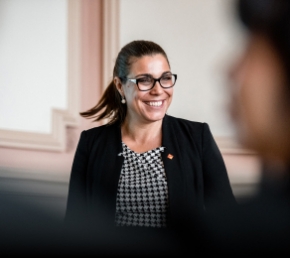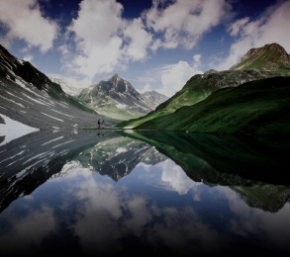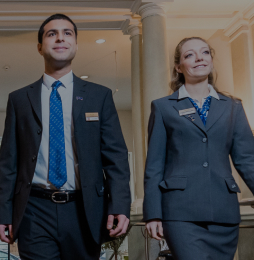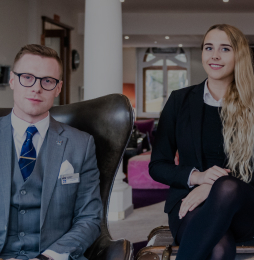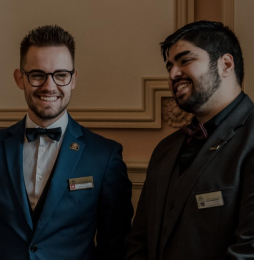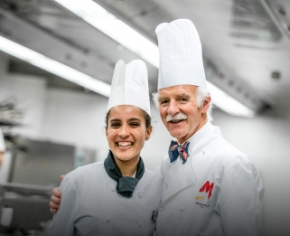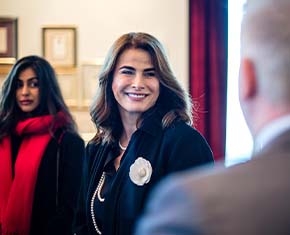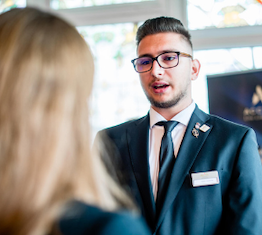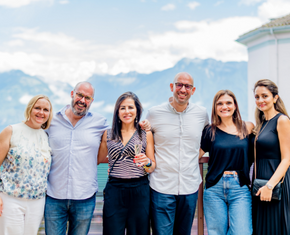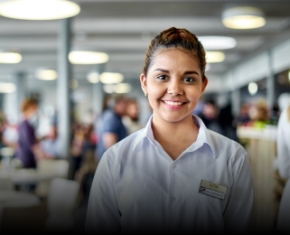- About
- Schools
- Lifelong Education
- News & Events
- Community
Our students attend the world’s biggest and most impactful youth leadership summit
Four of our stellar students, representing all four Swiss Education Group Schools, attend One Young World, the world's biggest and most impactful youth leadership summit, according to Vice.
Four visionaries, one monumental event: join us as we interview four remarkable students, Joaquin Sanchez Gonzalez, Wadzanayi "Wadzi" Musiya, Arthur Yang Su, and Sandanathi Keabetswe Mashita, representing all four Swiss Education Group Schools.
These motivated students joined other young leaders from more than 190 countries at the recent One Young World Summit in Belfast. This annual summit is where the brightest talent from every country and sector debate and devise innovative solutions to the world's most pressing issues.
Delegates attend the annual summit and leave as One Young World Ambassadors, returning from the summit with the means and motivation to make a difference in their communities and organizations.
Over four days, they were immersed in speeches, workshops, and networking while being mentored by global icons. Our students returned to us as One Young World Ambassadors with access to the power of a 15,000+ global network of young leaders to accelerate existing initiatives or establish new ventures. One Young World partners with over 190 international organizations, NGOs, and educational institutions - boasting the largest corporate footprint in its sector.
An unparalleled gathering of young leaders from every corner of the world.
Justin Trudeau
What inspired you to attend the One Young World Summit, and what impact do you hope to make through your participation?
Joaquin: What truly inspired me to attend the One Young World Summit was the opportunity to meet young leaders from around the world who have innovative solutions for severe problems the world is going through and some fresh ideas for my future. The impact I hope to make after my participation would be related to the awareness of all these global issues in my community and, in the long term, to be able to help with the food crisis, child education, and refugee situations.
Wadzi: I was drawn to the topics of discussion and the influential people who have spoken at past summits, like Meghan Markle and Desmond Tutu.
The five main topics were food insecurity, peace and reconciliation, mental health, climate change, and sustainability. The one I was most drawn to was mental health. I gained insight on how to incorporate it within companies and societies today.
I want to encourage acceptance and knowledge in my home country of Zimbabwe and in Africa. Everyone should have the right to express how they feel.
Arthur: I knew about The One Young World Summit through my older sister. She also participated in Munich, and when I told my family I was going to Belfast for the summit, they were very enthusiastic. So I came with expectations and demands, and I was not disappointed. There were so many people there who could inspire you, and it was an excellent opportunity to get to know new thoughts and approaches off-stage. It is my dream to be a leader in the hospitality industry in the future. Acceptance, fairness, and equality of competition were high on the agenda, and I plan to implement these in the future.
Sandanathi: The inspiration to attend the One Young World Summit was based on the videos of previous summits and how inspiring it would be to be around people with the same drive for change. I want to be an ally in the best way possible to people at higher disadvantages in the world just based on who they are.
Can you share a personal story or experience that has shaped your passion for a specific global issue?
Joaquin: The majority of the population of the country where I come from, Panama, faces a severe issue with poverty. But what has caught my attention is the difficulties children face getting an education; many of them cannot even attend school for the required years, and others have to study in places with bad conditions. I strongly believe that if every kid had the opportunity to get a quality education, they would be able to change our country while having better opportunities for their families and society in general.
Wadzi: According to WHO, six of the ten countries with the greatest suicide rates in the world are in Africa.
During the Covid-19 pandemic, we were all forced to sit at home with our thoughts. I found myself talking to many fellow Zimbabweans, and the conversations revolved around mental health. The workaholics could not go to work. Consequently, it led to high rates of depression and anxiety. I lost two people close to my own age to suicide.
All these factors made me create my own online platform called "Healing Your Way," which allows individuals to express themselves freely. Together, we aim to change the stigma around mental health. Imagine that the cure for cancer could be trapped inside someone who battles with their mental health. How sad would it be to be unable to unlock this because they have no one to talk to?
Arthur: It isn't easy to single out a key moment. I am convinced that many impressions led me to deal with topics such as mental health in the workplace. Many people believe that it is and should remain a private topic. However, during these days, I was able to experience and learn that the employer can also contribute a lot. Of course, the issue of sustainability is still eminent and crucial. I was aware of this before the summit, but seeing how hard and innovatively people are working on solutions was inspiring. And this fact has strengthened my belief that these important issues are within reach.
Sandanathi: During the second day of the summit, I met two delegates from Uganda who had an organization that was helping disabled people further their education past high school. They were equipping them to not only obtain tertiary education but to find jobs after that as well. What inspired me with these delegates was that one of them was deaf and, even with those odds, had obtained tertiary education and a job. This made me realize that as an abled person, I have more than I need to assist disabled people to make their way into the world the way they deserve.
What role do you see young leaders playing in addressing climate change and sustainability challenges?
Joaquin: Being a hotel management student, it is obvious how important sustainability is. Young leaders recognize this challenge and are aware of their responsibility with all our precious resources on earth. Our generation is creating very innovative measures, activities, standards, and campaigns to make a change regarding climate change. As was said during the One Young World Summit, 'the next 1000 most successful companies will be the ones that are making a real change in terms of sustainability', and I am sure that the people managing and working in them will be young people.
Wadzi: Most young leaders are looking at the bigger picture when applying for jobs. The Rewired Earth website enables individuals to work for companies with sustainability goals that align with their own. The Little Green Nudge book has also been encouraged for use in universities. We all have a role to play in protecting our world.
Arthur: As a convinced Democrat, I believe in freedom of expression and that everyone has the right to share their convictions. However, a democracy must also be led, and decisions must be made because on the issues of sustainability and climate change, there can be no more hesitation and doubt. So, the responsible forces must lead the way, which is why I think it makes sense to unite young and ambitious people to fight these challenges in a coordinated way.
Sandanathi: Young leaders will be the biggest whistleblowers in bringing to light the lack of sustainable practices by big companies. We will also take charge in the creation of more ways of sustainable living.
What skills and competencies do you believe are essential for young leaders in today's interconnected and rapidly changing world?
Joaquin: A young leader needs to be empathic to understand others' situations, strong to face all the challenges ahead in their careers, and perseverant to overcome any difficulties. But the most important skill for a young leader looking forward to changing the world is to act right now. Despite the current situation or thoughts, young leaders acting now might fail today or tomorrow, but eventually, they will learn from the process and find a way to make an impact since time is their best friend.
Wadzi: We live in a VACU world; therefore, young leaders must be adaptable, culturally aware, and open-minded. The world requires dynamic people from all backgrounds who are not easily shaken by slight mishaps—rather, those who shake it off and look forward to how to improve processes.
Arthur: One must have a clear vision and be willing to change and question one's previous approaches. This does not mean that you have to throw away old values and proven tactics, but you should at least think about how you can do it better and then go into action with conviction and, above all, courage. Change needs courage and the right attitude, a fact that I could observe very often when international leaders talked about their own achievements.
Sandanathi: Leadership skills involve empathy, communication, and innovative and creative thinking.
Our students seeing all the latest innovations for a brighter, sustainable future at the One Young World Summit, Belfast
If you are interested in life-changing and world-shaping opportunity, learn about our schools, we invite you to download a brochure.

